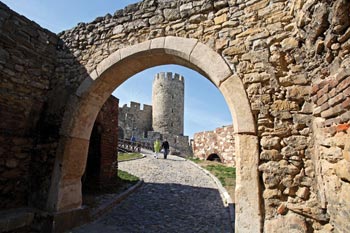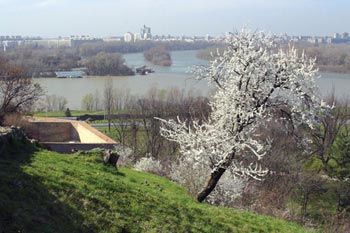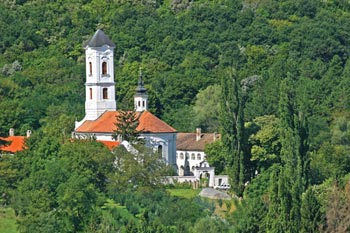| Belvedere
ROADS OF RECONSTRUCTION: TACTICS OF TRIVIAL AFFAIRS
A war without blood and rest
”Confronted with many problems, we should first turn to ourselves and our environment, applying the tactics of so-called trivial but really basic affairs. We should lead a war against corruption, ugliness, neglect and all other tracks of evil which surround us, unworthy of a man. It is probably the work of the Devil, who sleeps not, digging out and tearing down the work of the Creator. The battle against corruption is the every day duty of every conscientious man”
By: Dragan Nedeljković (Ph. D.)
 Faced with our countless and discouraging misses and corruptions I often think of Anton Pavlovich Chekhov: when the revolutionaries imagined and constantly tried to tear down, from top to bottom, the existing world, which did not satisfy them, and to create a new, ideal world, the ironic Chekhov did not believe that this wonder could happen and he suggested the every day persistent and devoted work, every man in his own place and in his own domain, patiently fixing what was damaged, satisfying with the ”tactics of trivial work”, which is really important and lifesaving. It is better to stand on solid ground than to be in the clouds; it is more useful to do what is possible than to be carried away by the impossible, to work with hope than to deal with illusions. We can find a similar thought with Nikolaj Velimirović, who does not support that higher forces are accused for all evil, for example ministers, while very few people think that they could be the problem. The author of Travnik Chronicle speaks about the battle against corruption which is the everyday duty of every conscientious man. Faced with our countless and discouraging misses and corruptions I often think of Anton Pavlovich Chekhov: when the revolutionaries imagined and constantly tried to tear down, from top to bottom, the existing world, which did not satisfy them, and to create a new, ideal world, the ironic Chekhov did not believe that this wonder could happen and he suggested the every day persistent and devoted work, every man in his own place and in his own domain, patiently fixing what was damaged, satisfying with the ”tactics of trivial work”, which is really important and lifesaving. It is better to stand on solid ground than to be in the clouds; it is more useful to do what is possible than to be carried away by the impossible, to work with hope than to deal with illusions. We can find a similar thought with Nikolaj Velimirović, who does not support that higher forces are accused for all evil, for example ministers, while very few people think that they could be the problem. The author of Travnik Chronicle speaks about the battle against corruption which is the everyday duty of every conscientious man.
Confronted with many problems, we should first turn to ourselves and our environment, applying the tactics of so-called trivial but really basic affairs. We should lead a war against corruption, ugliness, neglect and all other tracks of evil which surround us, unworthy of a man. It is probably the work of the Devil, who sleeps not, digging out and tearing down the work of the Creator.
Some European humanists, who coordinated the faith in God with the faith in Man, emphasized that God fight as well, God, the great Creator, the principle of Good, Love and Creativity, against the Devil, who personifies Evil, Hate and Destruction. We all take part in this big war, endless war, often uncertain. The duty of real people is to be on the side of God. To unite, join, because they won’t achieve much if they are lonely and separated, and they should never forget: ”Where there is unity – there is God.”
THE GREAT PASSION OF SILENT WORKERS  Serbs should often be reminded, Serbs who are obliged to themselves, and to God, to deny the evil destiny: ”The Serb’s worst enemy is himself”. The Serbs should be dressed in Love, to be worthy of their apostle, Saint Sava, who did everything to introduce Serbs into consecrated people, consecrated to Goodness, the most beautiful sign of sublime domination. Serbs should often be reminded, Serbs who are obliged to themselves, and to God, to deny the evil destiny: ”The Serb’s worst enemy is himself”. The Serbs should be dressed in Love, to be worthy of their apostle, Saint Sava, who did everything to introduce Serbs into consecrated people, consecrated to Goodness, the most beautiful sign of sublime domination.
It is a holy duty to keep the legacy of Saint Sava. Today, we often hear about the Socialistic Yugoslavia. However, during that period, a lot was done on restoring medieval religious homes. It is the merit of our historians of art who have charmed Stanka Veselinov, the former minister, for that kind of project. Milorad Panić Surep also did some important things. A lot of money was invested for works in Studenica, Žiča, Sopoćani, Đurđevi stupovi, Peter’s Church, Manasija, Prohor Pčinjski, Kalenić.
Monsteries on Kosovo and Metohia, renovated, were endangered again: Peć, Gračanica, Dečani. The Holy Mother of God Ljeviška in Prizren was destroyed again, then Devič and Sokolica as well as many other monasteries and churches. The Holy Archangels of Emperor Dušan and Banjska of King Milutin are emerging from ruins. Monastery fraternities and sisterhoods in Kosovo and Metohia are to be admired, which are maintained and widen in the most difficult conditions.
Autonomy fighters from Voivodina have neglected the restoration of monasteries of Fruška Gora, destroyed by Ustashas and the Nazis. When the traitors fell, the renovation of Novo Hopovo, Grgeteg, Velika Remeta, Mala Remeta, Rakovac, Privina Glava, Petkovica, Đipša, Beočin, Vrdnik, Jasak and Fenek were finished. The renovation of Šišatovac, Kuveždin, Staro Hopovo is late and Bešenovo is leveled to the ground. Krušedol, the former bishop capital, later moved to Sremski Karlovci, is expecting its jubilee — five centuries of its existence. It is impossible to renovate the robbed or destroyed monastery treasuries, libraries, icons and iconostasis.
A lot of things depend on people, on their renovating passion, on love and feeling of duty. Bishop Filaret was the one who renovated Mileševa. And not only Mileševa but other monasteries as well, especially, The Holy Trinity near Pljevlja and Bishop’s Court in Prijepolje. These are real pearls. For the renovation of Velika Remeta Prior Stefan has all the merits, Archimandrite Dositej for Grgeteg, Prioress Antonina for Petkovica, Prior Gavrilo for Privina Glava, Abbes of the Monastery Gradac, Efimija, for Stara and Nova Pavlica, Archpriest Dušan Marjanović from Sremska Mitrovica for Đipša and Šišatovac. We did not mention all important renovators.
I TRAVEL, I REGRET  The beauty of Serbia deserves a lot of love. Even our capital is neglected. It is obvious that we do not love it enough. On a glorious location, above two rivers, with several islands on them, with a tempestuous and beautiful history, several times destroyed and several times, as the Phoenix, raised from its ashes, a town open for everyone, which does not exclude or hate anyone, a town of endless freedom, in one word — a town of Love, which was praised by the poet in Slovo Ljubve (A Homage to Love). This town deserves to be loved, with special devotion, tenderness and respect in the heart, which means that the town should be clean, with no garbage. Not only literally clean but clean in language, with no curses, and the town is full of curses. That is not beautiful. It is disgusting! The beauty of Serbia deserves a lot of love. Even our capital is neglected. It is obvious that we do not love it enough. On a glorious location, above two rivers, with several islands on them, with a tempestuous and beautiful history, several times destroyed and several times, as the Phoenix, raised from its ashes, a town open for everyone, which does not exclude or hate anyone, a town of endless freedom, in one word — a town of Love, which was praised by the poet in Slovo Ljubve (A Homage to Love). This town deserves to be loved, with special devotion, tenderness and respect in the heart, which means that the town should be clean, with no garbage. Not only literally clean but clean in language, with no curses, and the town is full of curses. That is not beautiful. It is disgusting!
Belgrade deserves that we behave ourselves in it like in a temple, as pious persons, and to feel festive, aware that we are privileged to live in it. And this applies to Serbia as well, whose residents we are as well. A Frenchman, of Russian origin, said during a ceremony: Serbia is the capital of the world because it is the capital of suffering. Did you hear him, the people of Belgrade? And Crnjanski wrote the Lament over Belgrade. One should know all of this. One should respect and love. And one should be proud, self-conscious and responsible.
I travel through Serbia. I grieve for herds of cattle in the fields, like in Switzerland and Holland, France and England. In villages, towns and cities of flowers.
I regret that our Serbian affairs are not the best of affairs and that we reconcile that those are often bad affairs.
I regret that we think badly of ourselves even if we are not worse than others. We are better than many. There are bad people everywhere, even here. But not little good, honest and wonderful people. I am sure that they make a majority. Only that they are silent. People who curse, slanderers, thieves and fakes are louder and more energetic. One should not out shout and push them, but the majority of good people should unite to become stronger and to become the light to show the right way.
I travel and I regret. We have wonderful spas and mountains. (The Serbian seaside, from the time of the Nemanjić dynasty and from Šantić’s song ”Our dear Boka, the bride of Jadran”, we have lost, forever!) I have stayed in best hotels in Vrnjačka and I was not satisfied because we can achieve the good quality, close to perfection, toward which we have to gravitate. It is said that Koviljača is a royal spa, compared to Vichy, Baden-Baden, and Karlovy Vary. I know that the comparison is naive. Kursalon, when it was in its greatest glow, and now it is closed, was never so good as the salons in Baden-Baden, where Turgenev, Dostoyevsky and their heroes and heroines stayed. There is a Special Hospital for Rehabilitation in Koviljača. I know that it does not drop behind similar institutions in France, in which I stayed thanks to an unlucky coincidence. It is the merit of Doctor Nikola Sremčević and his brilliant team.
THE DESTINY OF THE UNFORTUNATE BEAUTY My Fruška Gora is such a beauty, not very high but full of forests, idyllic and saint, with about 15 monasteries. Between two large towns, the Capital and ”Serbian Athens”, she is unused, as a beauty that has no luck, because she is not loved. The idyll is created by forests and groves, woods and meadows, and clean and attractive kafanas and restaurants and beautiful pastry shops, comfortable hotels. All of that is missing.
I ran across this beautiful mountain, inhaling the scent of its lime tree forests, but I didn’t taste the wine of Irig, of Bermet from Karlovci. But, I stopped in Vrdnik, knowing that I shall be upset, even if my anger was lessen with the visit of the beautiful monastery Jazak, in which rests Uroš The Weak, the son of Dušan the Great. In Ravanica, a long time ago, after the Great Migration, rested Emperor Lazar. The holy relics were there, in Ravanica in Srem, about two and a half centuries. The greatest celebration in Serbia was on Vidovdan (St. Vitus’ Day).
There was also a mine of brown coal. The mine was closed because the ore was harder and more expensive to reach; but God did not forget the blessed place: wonderful warm water gushed, healing water, a good reason to make a spa, with two swimming pools, an Olympic one and a smaller, closed one. A hotel was built. The staff is friendly, even if it is bad paid. The quality does not satisfy modern requirements.
The reason that I always get angry and I don’t want to have a rest in Vrdnik, is the reason that I got to the Community of Irig, which Vrdnik belongs to: what kind of a spa is this with no park in it?! Who want to take a walk, he must push among many cars and inhale their gases. (Zlatibor is nothing better than this!) It doesn’t have to be a real park but a walk, through orchards and meadows, towards Vrdnička Tower and Zmajevac, and towards the Monastery, and several benches along the path, for some rest. And the problem can be easily solved.
What should the people of Vrdnik do? They should arrange the facades of their homes, plant flowers, like Austrian and Swiss people. They should make a real spa of Vrdnik... That is the ”tactics of small affairs”, of which Chekhov was thinking about, or some of his heroes... I shall come to Vrdnik the moment I hear it has a path. I want to walk on it, all the way to Vrdnička Tower, if I don’t die until that moment. It’s God’s will.
(The author is a member of the European
Academy
of Sciences and Arts, Paris, France) |
